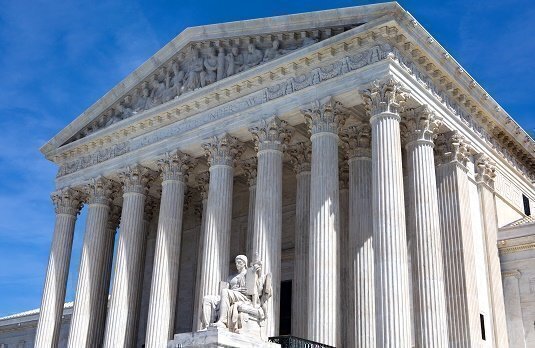The Supreme Court on Monday cancelled the hearing it had set for next month on the legality of President Trump’s order limiting entry into the U.S. of foreign travelers and refugees, giving the Justices time to weigh the impact of a substitute policy issued on Sunday. The court will now be weighing whether anything remains from the original controversy it had agreed to review.
 The likely practical effect, it appears, would be that the planned review simply will not occur, and that the new action would be met with new lawsuits, starting all over in the lower federal courts.
The likely practical effect, it appears, would be that the planned review simply will not occur, and that the new action would be met with new lawsuits, starting all over in the lower federal courts.
The court, in its order on Monday, explicitly asked lawyers on all sides of the dispute to file their views by a week from Thursday on whether the two granted cases – one from Maryland and one from Hawaii – are now “moot,” or legally dead. In both cases, lower courts had ruled that the Trump order was invalid, under either the Constitution or federal immigration law.
In a new “proclamation” issued over the weekend, the Trump Administration adopted what it called a “tailored” approach to limiting entry of foreign nationals, adding three countries to the list limiting entry, and keeping intact the limits on five of six nations on the original list – making a new total of eight.
The new policy applied only to the March 6 suspension, for 90 days, of entry of all foreign travelers from the list of Mideast nations with majority Muslim populations, and not to the 120-day suspension of entry of any refugee from anywhere in the world. The 90-day provision expired on Sunday, and the 120-day refugee suspension is now set to expire on October 24.
In asking lawyers to comment on the effect of the President’s new action, the Justices questioned whether both parts of the March 6 order have now been supplanted by the new approach, essentially scuttling the cases as they currently stand on the court’s docket.
The March 6 order barred entry temporarily of people from Iran, Libya, Somalia, Sudan, Syria and Yemen. In the new policy issued on Sunday, the entry bar was dropped for Sudan, but was newly applied to Chad, North Korea and to specified government officials of Venezuela.
Civil rights groups that had challenged the President’s earlier order, and succeeded to a significant degree, have indicated that the new order is not much different, thus signaling that they are probably going to challenge it now. For example, the American Civil Liberties Union argued that the new order “is still a Muslim ban.”
The White House issued, along with the new “proclamation” from the President, a series of four separate documents explaining all of the complex details of the new approach. The documents spelled out the review that government agencies had made of the ability of all foreign governments to supply to the U.S. information about their nationals who might seek entry to the U.S., and on their procedures for “vetting” such travelers. Based on the responses that came back, the documents said, officials picked out the eight countries whose vetting procedures, information gathering, or internal unrest made travelers from those nations ineligible to enter the U.S. with visas.
The proclamation spelled out, in at least a few details, what the defects were for each of the eight countries. But, for newly added North Korea, with whom the President has been exchanging insults and threats over its missile and nuclear programs, the new documents said only that “North Korea does not cooperate with the United States government in any respect, and fails to satisfy all information-sharing requirements.”
Where the new policy puts a ban on entry of foreign nationals from nations that were covered by the 90-day suspension, that provision went into effect on Sunday. As the new policy reaches the eight countries on the new list, including the five from the earlier list, those entry bars will go into effect on October 18. Unlike the suspensions under the March 6 order, there is no time limit on the new entry bars.
The Supreme Court had agreed late in June to rule on the legality of both the restrictions as they applied to Muslim-dominated nations and also as they applied globally to refugees, and a hearing was then scheduled on the Maryland and Hawaii cases for October 10. Under Monday’s order, that hearing was cancelled “pending further order.”
After the newly-ordered briefs are filed October 5, the Justices will then decide whether to dismiss the cases as moot, or to move ahead with review, in whole or part.
The court acted on the new development after U.S. Solicitor General Noel J. Francisco had filed on Sunday night a copy of the new Trump order. Francisco suggested that the court call for new briefs, on “the effects of the proclamation on the issues currently pending before the court in these cases.” He did not raise the issue of whether the new approach made those cases “moot.”
Legendary journalist Lyle Denniston has written for us as a contributor since June 2011 and has covered the Supreme Court since 1958. His work also appears on lyldenlawnews.com.







